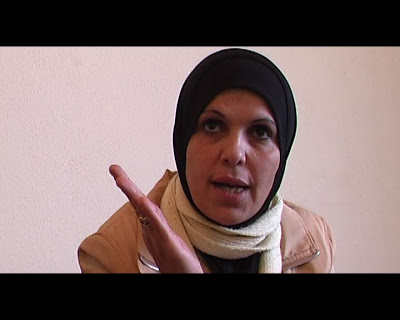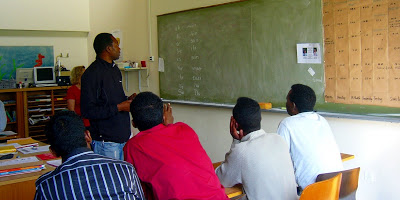2010-08-28
[en]Der Entscheid des libanesischen Parlaments von Mitte August, die Beschäftigungssituation von PalästinenserInnen zu verbessern, erhielt in den Medien weite Aufmerksamkeit und Lob. Die Reform ändert allerdings kaum etwas an den schwierigen Lebensumständen der Flüchtlinge im Libanon.Das Wichtigste vorweg: Der Libanon hat den PalästinenserInnen keine Bürgerrechte gewährt, wie es manche Medien fälschlicherweise verkündeten. Die rund 250.000 PalästinenserInnen, welche im Libanon leben, dürfen noch immer nicht in allen Berufen arbeiten und Eigentum besitzen oder vererben. Auch geniessen sie noch immer keine Bewegungsfreiheit, da die meisten ihrer Flüchtlingslager von libanesischen Armeeposten und Checkpoints eingekreist sind.
Im Juni reichte der Drusenführer Walid Jumblatt einen Gesetzesentwurf ein, welcher PalästinenserInnen diverse Bürgerrechte wie Freiheit in der Berufswahl oder Eigentumsrechte zugestand. Der Vorschlag gab sofort Anlass zu intensiven Diskussionen in Libanons politischen Kreisen. Er entzweite das Parlament – wie so oft – entlang konfessioneller Linien: Während die sunnitischen und schiitischen Parteien die Vorlage unterstützten, leisteten die christlichen Parteien Widerstand. Die parlamentarische Debatte wurde schliesslich verschoben, damit ein übergreifender Konsens erarbeitet werden konnte.
Während der letzten paar Jahre haben palästinensische Organisationen, AktivistInnen, und internationale Akteure wie die International Crisis Group, Human Rights Watch und das UNO-Hilfswerk für Palästina-Flüchtlinge (UNRWA) verstärkt eine Bürgerrechtsreform gefordert. Ereignisse wie der Krieg im Jahr 2007 in Nahr al-Bared Camp und die empfundene Bedrohung der inneren Sicherheit durch militante Gruppen in den Flüchtlingslagern haben auch viele LibanesInnen überzeugt, dass die Lebensbedingungen der PalästinenserInnen drastisch verbessert werden mussten.
Rex Brynen, Professor für Politikwissenschaft an der kanadischen Universität McGill und Koordinator des Palestinian Refugee ResearchNet wundert sich: "Ist es wirklich in Libanons Interesse, eine Viertelmillion vor den Kopf gestossene, verarmte und marginalisierte Flüchtlinge im Land zu haben – und dadurch die Voraussetzungen für ein weiteres Nahr al-Bared zu schaffen?" Er argumentiert, dass eine Ausweitung der zivilen und wirtschaftlichen Rechte der Flüchtlinge die Risiken einer Radikalisierung verringern und es einfacher machen würde, einen Dialog über weitere ungelöste Themen in Gang zu bringen.
Nach libanesischem Recht werden PalästinenserInnen als staatenlose Flüchtlinge betrachtet, obwohl die allermeisten von ihnen im Libanon geboren sind und dort ihr ganzes Leben verbracht haben. Die meisten qualifizierten Berufe bleiben für sie verboten und ihnen bleibt die Wahl zwischen illegaler Arbeit verbunden mit grossem Ausbeutungsrisiko, Handlangerjobs oder Emigration.
Während der Verhandlungen über die Bürgerrechtsreform wurden Jumblatts ursprüngliche Vorschläge massiv verwässert – vor allem wegen des starken Widerstands der christlichen Parteien. Für Brynen ist das Resultat "eine Enttäuschung." Sari Hanafi, ausserordentlicher Professor an Beiruts American University und palästinensischer Aktivist, urteilt ähnlich: "PalästinenserInnen können darüber alles andere als glücklich sein."
Hanafi erklärt, dass auch nach der 'Reform' PalästinenserInnen noch immer in vielen anspruchsvollen, von Verbänden kontrollierten Berufen, nicht arbeiten dürfen. Obwohl sie zwar nicht mehr durch das Gesetz davon abgehalten werden, leiden sie nun unter der Diskriminierung durch die Verbandsregeln. Viele qualifizierte Berufe bspw. in der Justiz, in der Medizin oder im Baugewerbe bleiben für PalästinenserInnen unzugänglich.
Libanons sogenannte 'Bürgerrechtsreform' ist ihren Namen nicht wert. "Das neue Gesetz wird bloss nützlich sein, wenn es ein erster Schritt zu weiteren Reformen darstellt," sagt Rex Brynen und fährt fort: "Ich befürchte aber, dass es weitere Reformen verhindern wird."
Dieser Bericht wurde von einem unserer AktivistInnen verfasst und hier von der schwedischen Wochenzeitung Arbetaren publiziert.





















